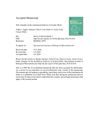 6 citations,
June 2022 in “Dermatologic Therapy”
6 citations,
June 2022 in “Dermatologic Therapy” Honokiol from Magnolia plants may be beneficial for treating various skin conditions and promoting hair growth.
5 citations,
February 2022 in “Animals” Sodium sulfide slows wound healing, while electric shaving is the safest for preoperative hair removal.
 5 citations,
February 2022 in “Acta Biomaterialia”
5 citations,
February 2022 in “Acta Biomaterialia” Nanomaterials can improve hair care products and treatments, including hair loss and alopecia, by enhancing stability and safety, and allowing controlled release of compounds, but their safety in cosmetics needs more understanding.
 4 citations,
December 2022 in “International Journal of Molecular Sciences”
4 citations,
December 2022 in “International Journal of Molecular Sciences” Zinc is crucial for skin health and treating various skin disorders.
4 citations,
March 2022 in “Pharmaceutics” Regenerative cellular therapies show promise for treating non-scarring hair loss but need more research.
 3 citations,
March 2023 in “Life”
3 citations,
March 2023 in “Life” Obesity can worsen wound healing by negatively affecting the function of stem cells in fat tissue.
1 citations,
May 2024 in “Pharmaceutics” Hemp is a promising ingredient for skin products due to its healing and soothing properties.
 1 citations,
September 2023 in “Stem cell research & therapy”
1 citations,
September 2023 in “Stem cell research & therapy” Mesenchymal stem cells could help treat aging-related diseases better than current methods.
 1 citations,
February 2023 in “ACS Biomaterials Science & Engineering”
1 citations,
February 2023 in “ACS Biomaterials Science & Engineering” The new microwell device helps grow more hair stem cells that can regenerate hair.
1 citations,
December 2022 in “Pharmaceutics” Finasteride-loaded microemulsions can effectively enhance skin delivery for treating hair loss.
 November 2024 in “Applied Sciences”
November 2024 in “Applied Sciences” Placenta products might help with hair loss, but more research is needed.
 July 2024 in “Experimental Dermatology”
July 2024 in “Experimental Dermatology” AP collagen peptides help hair grow and improve hair health.
 May 2024 in “Clinical Cosmetic and Investigational Dermatology”
May 2024 in “Clinical Cosmetic and Investigational Dermatology” Manipulating cell cleanup processes could help treat hair loss.
April 2024 in “Molecules/Molecules online/Molecules annual” Paris polyphylla saponins may effectively treat acne due to their antibacterial and anti-inflammatory properties.
January 2024 in “Metabolites” Standardized procedures are crucial for collecting and preparing biological samples to ensure accurate clinical metabolomics results.
 November 2023 in “International Journal of Medical Sciences”
November 2023 in “International Journal of Medical Sciences” New regenerative medicine-based therapies for hair loss look promising but need more clinical validation.
 August 2023 in “Processes”
August 2023 in “Processes” Fermenting Dendrobium officinale with Lactobacillus reuteri CCFM8631 increases its skin care benefits.
 August 2023 in “International Journal of Molecular Sciences”
August 2023 in “International Journal of Molecular Sciences” Human skin xenografting could improve our understanding of skin development, renewal, and healing.
 June 2023 in “Plastic and Reconstructive Surgery – Global Open”
June 2023 in “Plastic and Reconstructive Surgery – Global Open” Exosomes may improve skin, scars, hair growth, and fat grafts in plastic surgery, but more research is needed.
 November 2022 in “Bioengineering”
November 2022 in “Bioengineering” The method can test hair growth products using a lab-made hair-like structure that responds to known treatments.
 13 citations,
May 2016 in “International journal of biological macromolecules”
13 citations,
May 2016 in “International journal of biological macromolecules” Keratin's mechanical properties are influenced by hydrogen bonds and secondary structure, and can be improved with the SPD-2 peptide.
 14 citations,
September 1954 in “Textile Research Journal”
14 citations,
September 1954 in “Textile Research Journal” Hair absorbs different substances from solutions based on pH levels.
11 citations,
April 2022 in “Biophysical Journal” Disulfide bonds in keratin fibers break more easily under stress, especially when wet, affecting fiber strength.
 20 citations,
July 1988 in “Clinics in dermatology”
20 citations,
July 1988 in “Clinics in dermatology” Thioglycolate lotions are the most popular method for permanent waving and hair straightening.
 October 2021 in “The Egyptian Journal of Hospital Medicine ”
October 2021 in “The Egyptian Journal of Hospital Medicine ” Combination therapies work better than single treatments for atrophic acne scars.
 December 2023 in “The journal of physical chemistry. B (1997 : Online)”
December 2023 in “The journal of physical chemistry. B (1997 : Online)” Human hair keratin might be good for filtering out harmful substances from water.
 January 2024 in “Molecules (Basel. Online)”
January 2024 in “Molecules (Basel. Online)” Juglone from walnut extracts may help repair damaged hair.
 January 2024 in “Archives of Biological Sciences (Beograd)”
January 2024 in “Archives of Biological Sciences (Beograd)” AP collagen peptides may help hair grow better and become stronger.
 November 2023 in “ACS Applied Polymer Materials”
November 2023 in “ACS Applied Polymer Materials” The new method extracts keratin from hair faster and better, and the resulting product improves blood clotting and wound healing, with potential for personalized treatments.
 4 citations,
November 2022 in “Journal of biomedical materials research. Part B, Applied biomaterials”
4 citations,
November 2022 in “Journal of biomedical materials research. Part B, Applied biomaterials” Human hair proteins, especially keratins, can protect cells from oxidative stress in lab settings.























